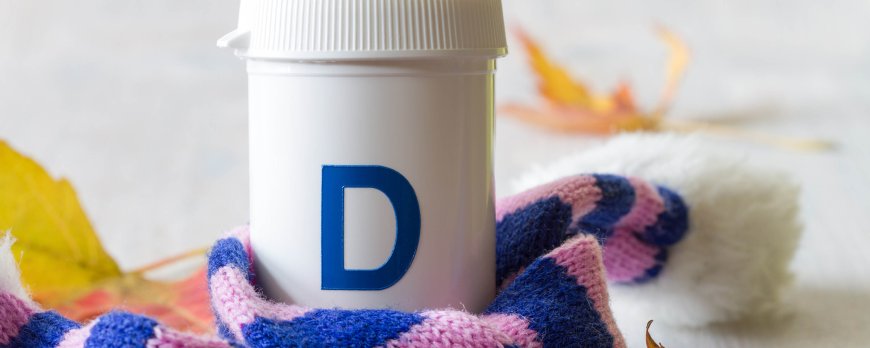Can too much vitamin D3 be harmful?
Explore the answer to 'Can too much vitamin D3 be harmful?' as we delve into the effects of overdosing on this crucial nutrient for your health.

Can too much vitamin D3 be harmful?
Vitamin D3 is an essential nutrient for maintaining optimal health, but is there a point when consuming too much of it becomes harmful? In this article, we will explore the potential risks and consequences of excessive vitamin D3 intake, known as vitamin D toxicity or hypervitaminosis D. We will delve into the causes, symptoms, and treatment of this condition, as well as provide guidelines for safe supplementation and prevention.
Key Takeaways:
- Vitamin D toxicity, or hypervitaminosis D, can occur when there is an excessive amount of vitamin D in the body.
- The main consequence of vitamin D toxicity is a buildup of calcium in the blood, which can lead to various symptoms and complications.
- Large doses of vitamin D supplements, rather than diet or sun exposure, are often the cause of vitamin D toxicity.
- Proper monitoring, dosing, and consulting with a healthcare professional are crucial to avoid vitamin D toxicity.
- Vitamin D toxicity is a rare condition but can be serious, requiring medical intervention and management strategies.

Understanding Vitamin D3 Toxicity
Vitamin D3 toxicity, also known as hypervitaminosis D, is a condition that arises when there is an excessive amount of vitamin D3 in the body, leading to potential health risks. While vitamin D is essential for various bodily functions, consuming too much can have adverse effects on health.
The main consequence of vitamin D3 toxicity is a buildup of calcium in the blood, a condition known as hypercalcemia. This can result in symptoms such as nausea, vomiting, weakness, frequent urination, bone pain, and kidney problems. In severe cases, it can even lead to kidney damage and heart complications.
It's important to note that vitamin D3 toxicity is rare and usually occurs due to excessively high doses of vitamin D3 supplements, rather than through diet or sun exposure. Taking 60,000 international units (IU) of vitamin D per day for several months has been shown to cause toxicity. Therefore, it is crucial to follow the recommended daily allowance and only take higher doses under the guidance of a healthcare professional.
Risks and Causes of Vitamin D3 Toxicity
- Vitamin D3 toxicity is more common in people with certain medical conditions, such as primary hyperparathyroidism or granulomatous diseases.
- Misuse of vitamin D3 supplements can also significantly increase the risk of toxicity. It is essential to follow the recommended dosage and avoid self-prescribing high doses without professional guidance.
- Excessive intake of vitamin D3 through fortified foods and medications can contribute to vitamin D3 toxicity. It is crucial to be aware of the sources of vitamin D3 and maintain a balanced intake.
In conclusion, while vitamin D3 is vital for overall health, excessive intake can lead to toxicity and potentially severe health risks. It is essential to understand the potential dangers and risks associated with high vitamin D3 levels and consult a healthcare professional for proper monitoring and management of vitamin D3 intake. By maintaining moderation and following recommended guidelines, one can ensure optimal vitamin D3 levels without risking toxicity.
For more information on vitamin D3, its recommended intake, and potential risks, refer to the additional resources provided.
Causes of vitamin D3 toxicity
Vitamin D3 toxicity is primarily caused by the overconsumption of vitamin D3 supplements, highlighting the need for caution in maintaining appropriate levels. Although vitamin D3 is an essential nutrient for the body, excessive intake can lead to a buildup of calcium in the blood, resulting in various health complications.
One of the major causes of vitamin D3 toxicity is the misuse of supplements. Taking high doses of vitamin D3 supplements without proper medical guidance can significantly increase the risk of toxicity. It's important to follow the recommended daily allowance and consult with a healthcare professional before exceeding the recommended dosage.
In addition to supplement misuse, excessive intake of vitamin D3 through fortified foods and medications can also contribute to toxicity. Some fortified foods and medications contain high levels of vitamin D3, and consuming them in excess can lead to an accumulation of the nutrient in the body. It is crucial to be mindful of all sources of vitamin D3 and ensure that the total intake remains within safe limits.
Factors that increase the risk of vitamin D3 toxicity:
- Medical conditions: Certain medical conditions, such as kidney disease and hyperparathyroidism, can affect the body's ability to regulate vitamin D3 levels, increasing the risk of toxicity.
- Supplement misuse: Taking excessive amounts of vitamin D3 supplements without medical supervision can greatly elevate the risk of toxicity.
- Excessive exposure: Consuming large amounts of vitamin D3 through fortified foods or medications can contribute to higher levels in the body, potentially leading to toxicity.
To prevent vitamin D3 toxicity, it is essential to maintain a balance in vitamin D3 intake. This can be achieved by following the recommended daily allowance and consulting with a healthcare professional for personalized guidance. Proper monitoring and dosing of vitamin D3 supplements are crucial to avoid the dangers of a surplus of vitamin D3.
Symptoms of Vitamin D3 Toxicity
Exceeding the recommended levels of vitamin D3 intake can lead to various symptoms and potential health complications. Vitamin D toxicity, also known as hypervitaminosis D, occurs when there is an excessive amount of vitamin D in the body. This condition is typically caused by high doses of vitamin D supplements rather than through diet or sun exposure.
The main consequence of vitamin D toxicity is a buildup of calcium in the blood, which can result in several symptoms. These may include nausea and vomiting, weakness, frequent urination, bone pain, and kidney problems. In more severe cases, vitamin D toxicity can lead to altered mental status and kidney complications.
It is important to note that vitamin D toxicity is a rare condition that usually occurs with long-term, high-dose supplementation. Taking 60,000 international units (IU) of vitamin D per day for several months has been shown to cause toxicity. Therefore, it is crucial to adhere to the recommended daily allowance and consult with a healthcare professional before taking doses higher than the recommended levels.
Symptoms of Vitamin D3 Toxicity:
- Nausea and vomiting
- Weakness
- Frequent urination
- Bone pain
- Kidney problems
Vitamin D toxicity is more common in individuals with certain medical conditions, those who misuse supplements, and those exposed to excessive amounts of vitamin D through fortified foods or medications. To mitigate the risk of vitamin D3 toxicity, it is essential to monitor and properly dose vitamin D3 supplements. Always follow the recommended daily allowance and consult with a healthcare professional for guidance on appropriate dosage.
Treatment for vitamin D3 toxicity
When vitamin D3 toxicity occurs, prompt treatment is crucial to mitigate the potential risks and alleviate symptoms. The first step in treating vitamin D3 toxicity is to immediately stop taking any vitamin D supplements and restrict dietary calcium intake. This helps to prevent further calcium buildup in the blood and alleviate the symptoms associated with vitamin D3 toxicity.
In severe cases of vitamin D3 toxicity, medical intervention may be necessary. This can involve administering intravenous fluids to help restore electrolyte balance and using medications to help manage symptoms. Close monitoring of blood calcium levels and kidney function is also essential during the treatment process.
It's important to note that vitamin D3 toxicity is rare and usually occurs as a result of excessive supplementation. It is recommended to only take doses higher than the recommended daily allowance under the care and guidance of a healthcare professional.
Recommended daily allowance for vitamin D3
To avoid the risk of vitamin D3 toxicity, it is essential to understand and adhere to the recommended daily allowance for this crucial nutrient. The recommended daily allowance (RDA) of vitamin D3 varies depending on age, sex, and certain health conditions. For most healthy adults, the RDA is 600-800 international units (IU) per day. However, individuals with limited sun exposure, darker skin tones, or certain medical conditions may require higher doses.
It is important to note that excessive vitamin D3 intake can lead to toxicity. The tolerable upper intake level (UL) for vitamin D3 is 4,000 IU per day for adults. Taking doses higher than the UL without medical supervision can increase the risk of developing vitamin D3 toxicity. It is always recommended to consult with a healthcare professional to determine the appropriate dosage of vitamin D3 supplementation.
Sources of vitamin D3
Vitamin D3 can be obtained through various sources, including sunlight, dietary intake, and supplements. Sunlight exposure triggers the production of vitamin D3 in the skin, but it is important to balance sun exposure with proper sun protection to avoid skin damage. Foods rich in vitamin D3 include fatty fish, fortified dairy products, and egg yolks. However, it can be challenging to get enough vitamin D3 through diet alone, especially for individuals with restricted diets or limited sun exposure.
Supplementation is a common way to ensure adequate vitamin D3 levels, particularly for individuals who are at risk of deficiency or have difficulty obtaining enough through diet and sunlight. However, it is crucial to follow the recommended dosage and not exceed the UL for vitamin D3 to prevent toxicity. Regular monitoring of vitamin D3 levels and consulting with a healthcare professional can help ensure safe and effective supplementation.
To summarize, understanding and adhering to the recommended daily allowance for vitamin D3 is essential to avoid the risk of toxicity. Balancing sunlight exposure, incorporating vitamin D-rich foods into the diet, and considering supplementation when necessary can help maintain optimal vitamin D3 levels and support overall health.

Factors that Increase the Risk of Vitamin D3 Toxicity
While vitamin D3 toxicity is rare, certain factors can elevate the risk, necessitating extra caution and awareness. It is important to be mindful of these factors to prevent the adverse effects of excessive vitamin D3 levels. Here are some key factors to consider:
- Medical conditions: Certain medical conditions, such as primary hyperparathyroidism, sarcoidosis, and certain lymphomas, can increase the risk of vitamin D3 toxicity. These conditions can disrupt the body's ability to regulate calcium levels, making it more susceptible to the buildup of calcium in the blood.
- Supplement misuse: Taking higher doses of vitamin D3 supplements than recommended can significantly increase the risk of toxicity. It is crucial to follow the recommended daily allowance and consult with a healthcare professional before exceeding the recommended dosage.
- Excessive vitamin D3 exposure: Individuals who are exposed to excessive amounts of vitamin D3 through fortified foods and medications should be cautious. Fortified dairy products and certain medications may contain higher levels of vitamin D3, which, when combined with other sources of the vitamin, can increase the risk of toxicity.
It is essential to monitor vitamin D3 levels regularly, especially for individuals with underlying medical conditions or those who require supplementation. Healthcare professionals can accurately assess vitamin D3 levels and provide guidance on dosage adjustments, ensuring a safe and appropriate intake to avoid the adverse effects of vitamin D3 toxicity.
Precautions for Vitamin D3 Supplementation
- Consult a healthcare professional: Before starting vitamin D3 supplementation, it is important to consult with a healthcare professional who can assess your individual needs and determine the appropriate dosage. This will help prevent excessive vitamin D3 intake and reduce the risk of toxicity.
- Follow the recommended daily allowance: Stick to the recommended daily allowance for vitamin D3 intake. For adults, the general guideline is 600-800 international units (IU) per day, while individuals with certain medical conditions may require higher doses under medical supervision.
- Regular monitoring: Regularly monitor vitamin D3 levels through blood tests to ensure they are within the optimal range. This allows for adjustments in supplementation to maintain a balanced level without exceeding the safe limit.
By being mindful of these factors and taking necessary precautions, individuals can safely supplement with vitamin D3 while minimizing the risks of high levels and potential adverse effects. Remember to always consult with a healthcare professional for personalized advice and guidance.
Monitoring Vitamin D3 Supplementation
Regular monitoring and careful dosing of vitamin D3 supplements are critical to avoid exceeding safe levels and experiencing adverse effects. As with any supplement, it is important to follow the recommended daily allowance and consult with a healthcare professional for personalized guidance.
Here are some key points to consider when monitoring your vitamin D3 supplementation:
- Consultation with a healthcare professional: Before starting any supplement regimen, it is essential to consult with a healthcare professional who can assess your individual needs and determine the appropriate dosage for you. They can also monitor your progress and make any necessary adjustments to ensure you are within the safe range.
- Regular blood tests: Periodic blood tests can help measure your vitamin D3 levels and detect any signs of toxicity. This allows for timely intervention if levels are too high.
- Proper dosing: Stick to the recommended daily allowance for vitamin D3 intake unless specifically advised otherwise by a healthcare professional. Avoid self-medicating or taking higher doses without proper guidance.
- Be mindful of other sources: Consider the total amount of vitamin D3 you are receiving from all sources, including fortified foods, medications, and sunlight exposure. Be aware of the cumulative effects to avoid unintentional overdose.
By following these precautions and maintaining open communication with your healthcare professional, you can ensure that your vitamin D3 supplementation remains within safe limits and reduces the risk of vitamin D3 toxicity.

Vitamin D3 Overdose Through Fortified Foods and Medications
Excessive consumption of fortified foods or medications containing vitamin D3 can contribute to an overdose and increased risk of adverse effects. Vitamin D toxicity, although rare, can occur when there is an excessive amount of vitamin D in the body. While vitamin D is essential for maintaining proper bone health and supporting overall well-being, too much of it can lead to harmful consequences.
Risks of High Vitamin D3 Levels
Vitamin D toxicity is characterized by elevated blood levels of vitamin D and calcium, resulting in a buildup of calcium in the blood. This can manifest in various symptoms, such as nausea and vomiting, weakness, frequent urination, bone pain, and kidney problems. It is crucial to recognize and address these symptoms promptly to prevent further complications.
To mitigate the risk of vitamin D3 overdose, it is important to exercise caution when consuming fortified foods and medications. Proper monitoring and dosing of vitamin D supplements, especially if they exceed the recommended daily allowance, are essential to avoid toxicity. Additionally, individuals with certain medical conditions or those who misuse supplements are at a higher risk and should consult with healthcare professionals for guidance.
Precautions for Vitamin D3 Supplementation
When supplementing with vitamin D3, it is crucial to follow the recommended guidelines and consult with a healthcare professional. They can determine the appropriate dosage based on an individual's specific needs and circumstances. By taking the necessary precautions, individuals can safely maintain optimal vitamin D levels without exceeding the safe limit, reducing the risk of vitamin D toxicity.
In conclusion, while vitamin D3 is an essential nutrient, excessive intake through fortified foods and medications can lead to an overdose and pose risks to health. It is important to be mindful of the sources of vitamin D3 and seek medical advice when supplementing to ensure proper dosing and avoid the potential adverse effects of vitamin D3 toxicity.

Precautions for Vitamin D3 Supplementation
Taking necessary precautions when supplementing with vitamin D3 is crucial to avoid potential harm and maintain overall health. While vitamin D3 is essential for various bodily functions, excessive intake can lead to vitamin D toxicity, which can have adverse effects on the body. Here are some important precautions to consider:
- Consult with a healthcare professional: Before starting any supplementation, it is advisable to consult with a healthcare professional who can assess your individual needs and provide guidance on the appropriate dosage.
- Follow recommended daily allowances: It is important to adhere to the recommended daily allowance for vitamin D3 intake, which is set to ensure optimal health without risking toxicity. Daily allowances may vary depending on age, sex, and other factors, so it is important to seek guidance specific to your circumstances.
- Avoid excessive intake: Taking high doses of vitamin D3 supplements can increase the risk of toxicity. It is recommended to avoid exceeding the recommended dosage and not to take doses higher than the daily limit without proper medical supervision.
- Monitor vitamin D3 levels: Regular monitoring of your vitamin D3 levels can help ensure that you are within the healthy range and not at risk of toxicity. This can be done through blood tests conducted by a healthcare professional.
- Be mindful of other sources: It's important to consider the total amount of vitamin D3 you are receiving from various sources, including fortified foods, medications, and sun exposure. Being aware of these sources can help prevent unintentional excessive intake.
- Report any symptoms: If you experience any unusual symptoms, such as nausea, vomiting, weakness, or persistent kidney problems, it is important to report them to your healthcare professional. These could be signs of vitamin D toxicity and should be addressed promptly.
By following these precautions, you can safely supplement with vitamin D3 and maintain optimal health without the risk of toxicity. Remember, moderation is key when it comes to vitamin D3 intake, and consulting with a healthcare professional is always recommended for personalized advice.
Conclusion
While vitamin D3 is essential for optimal health, it is crucial to maintain a balanced approach and avoid excessive intake to prevent potential harm. Vitamin D toxicity, also known as hypervitaminosis D, is a rare but serious condition that can occur when there is an excess amount of vitamin D in the body. This typically happens when large doses of vitamin D supplements are taken, rather than through diet or sun exposure.
Symptoms of vitamin D toxicity may include nausea, vomiting, weakness, frequent urination, bone pain, and kidney problems. Treatment involves stopping vitamin D intake, restricting dietary calcium, and possibly using intravenous fluids and medications. It is important to note that taking doses higher than the recommended daily allowance of vitamin D should only be done under the care of a healthcare professional.
Vitamin D toxicity is more common in individuals with certain medical conditions, those who misuse supplements, and those exposed to excessive amounts of vitamin D through fortified foods or medications. Proper monitoring and dosing of vitamin D supplements is crucial to avoid toxicity. If you are considering supplementing with vitamin D3, it is recommended to consult with a healthcare professional to determine the appropriate dosage and ensure safe supplementation.
Additional Resources
- National Institutes of Health: Office of Dietary Supplements
- The Vitamin D Council
- Mayo Clinic: Vitamin D
Additional Resources
For those seeking more in-depth information about vitamin D3 and its potential risks, the following resources can provide valuable insights and guidance:
-
The National Institutes of Health Office of Dietary Supplements - This comprehensive website offers detailed information on vitamin D, including recommended intake, potential risks of excessive consumption, and guidelines for supplementation. Visit their website at https://ods.od.nih.gov/factsheets/VitaminD-HealthProfessional/.
-
The Mayo Clinic - The Mayo Clinic provides a wealth of information on various health topics, including vitamin D toxicity. Their website offers articles, expert advice, and additional resources for understanding the risks and symptoms associated with excessive vitamin D intake. Find more information at https://www.mayoclinic.org/healthy-lifestyle/nutrition-and-healthy-eating/expert-answers/vitamin-d-toxicity/faq-20058108.
-
The American Academy of Dermatology - This reputable organization provides insights into the benefits and risks of sun exposure for vitamin D production. Their website offers guidance on obtaining vitamin D from natural sources and the potential harm of excessive supplementation. Learn more at https://www.aad.org/media/stats/prevention-and-care/vitamin-d-exposure.
-
The Centers for Disease Control and Prevention - The CDC offers resources on vitamin D recommendations, dietary sources, and potential adverse effects of excessive intakes. Their website provides valuable information for understanding the risks of vitamin D toxicity. Visit their website at https://www.cdc.gov/nutrition/index.html.
These resources can serve as valuable references for individuals seeking comprehensive information and guidance regarding vitamin D3 and its potential risks. It is important to consult with healthcare professionals for personalized advice and to avoid self-diagnosis or self-treatment.
































































































































